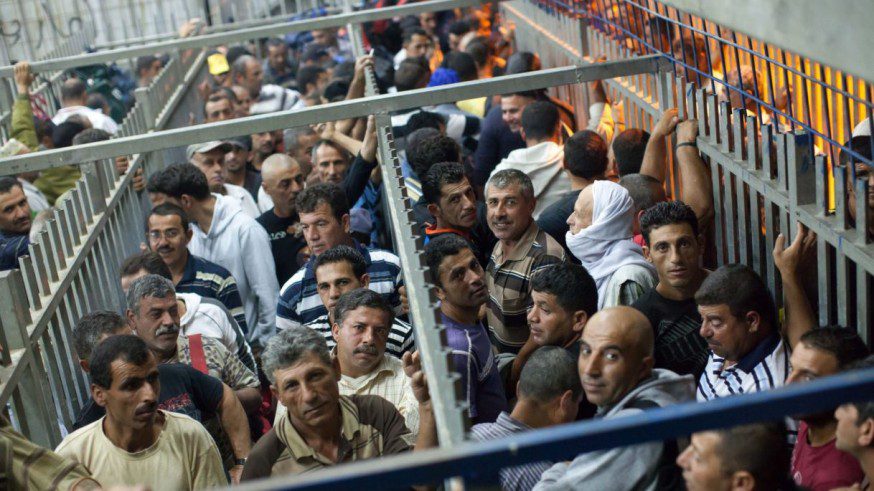In zijn rapport bevestigt VN-rapporteur Michael Lynk de conclusie van organisaties als Amnesty International, Human Rights Watch en B’Tselem dat Israël zich schuldig maakt aan de misdaad van apartheid. Die conclusie dient in Nederland eindelijk erkenning en consequenties te krijgen.

Deze week publiceerden wij een overzicht van meer dan vijftig rapporten en andere publicaties over het thema ‘Israël en de misdaad van apartheid’. Hoewel daaruit onomstotelijk blijkt dat Israël een apartheidsregime uitoefent over de Palestijnen, blijft in Nederland de erkenning daarvan en de vraag welke consequenties eraan moeten worden verbonden achterwege. Politiek Den Haag zwijgt, media negeren het thema en bedrijven, universiteiten en andere instellingen gaan de vraag naar consequenties angstvallig uit de weg.
Met de publicatie van zijn nieuwste rapport maakt VN-rapporteur Michael Lynk dit collectieve wegkijken nog moeilijker en beschamender dan het al was. Lynk, hoogleraar Recht in Canada, is Speciaal VN-Rapporteur voor de Mensenrechtensituatie in de sinds 1967 bezette Palestijnse gebieden. In die hoedanigheid rapporteert hij aan de VN-Mensenrechtenraad over de actuele situatie in bezet Oost-Jeruzalem, de Westelijke Jordaanoever en Gaza.
In zijn rapport van 18 pagina’s gaat Lynk in op de conclusie van vooraanstaande mensenrechtenorganisaties en deskundigen dat in Palestina/Israël sprake is van een apartheidsregime. Daarbij beperkt hij zich gezien zijn mandaat tot de bezette Palestijnse gebieden, hoewel Amnesty International en andere organisaties zich uitspreken over het hele gebied from the river to the sea, inclusief de erkende staat Israël. Lynk merkt overigens op dat Israël hem het werken tracht te bemoeilijken: hem wordt de toegang ontzegd tot de bezette Palestijnse gebieden, en een gewenste ontmoeting met de Israëlische VN-ambassadeur wordt door die laatste uit de weg gegaan.
Lynk legt in zijn rapport stap voor stap glashelder uit hoe de Israëlische bezetting van Palestina gepaard gaat met een regime van apartheid. Zijn betoog is strikt juridisch; Lynk spreekt maar één taal: die van het recht. Langs die lijn constateert hij dat na 55 jaar geen sprake meer is van een ‘bezetting’ – die eventueel had kunnen leiden tot een tijdelijke inperking van de rechten van de lokale Palestijnse bevolking –, maar van feitelijke annexatie en een genadeloos regime van apartheid. Zijn conclusie:
This is apartheid. […] With the eyes of the international community wide open, Israel has imposed upon Palestine an apartheid reality in a post-apartheid world.
Lynk zet in detail uiteen hoe diep het apartheidsregime ingrijpt in het leven van de Palestijnen. Hun collectieve (nationale) rechten en individuele mensenrechten worden over de hele linie geschonden. Zij kunnen zich onder meer niet vrijelijk bewegen en politiek verenigen en uitspreken, en ondervinden zware beperkingen op het gebied van onderwijs, werkgelegenheid, gezins- en familieleven en eigendomsrechten.
Lynk legt de vinger op de zere plek met zijn constatering dat deze ‘realiteit van apartheid’ onder ieders ogen vorm heeft gekregen, hoewel er van Palestijnse zijde al in de jaren negentig nadrukkelijk de aandacht op is gevestigd. Anders gezegd: de Israëlische apartheid heeft zich kunnen normaliseren doordat de buitenwereld de realiteit heeft genegeerd, zo niet glashard heeft ontkend. Van het lot van de Palestijnen is opzichtig weggekeken. Ook door Nederland.
Door weg te kijken negeerden alle betrokkenen – van politiek Den Haag tot bedrijven en instellingen – hun verantwoordelijkheden onder internationale verdragen en gedragscodes, die voorschrijven dat ernstige rechtenschendingen zoals apartheid niet mogen worden geaccepteerd, maar actief moeten worden bestreden. Aan die praktijk dient nu een einde te komen.
Het rapport van Lynk – bovenop de rapporten van Amnesty International, Human Rights Watch, B’Tselem, Al-Haq, Yesh Din en andere organisaties van naam en faam – dient te leiden tot erkenning van het feit dat het Israëlische apartheidsregime een misdaad tegen de menselijkheid is die consequenties moet krijgen. Van politieke partijen, maar ook van vakbonden, bedrijven en instellingen als universiteiten mag worden verlangd dat zij na jaren van stilzwijgen de realiteit onder ogen zien en er concrete gevolgen aan verbinden.
Om te bevorderen dat het rapport tot actie leidt publiceren we hieronder Lynks conclusies. Ze confronteren de lezer met een naar iedere maatstaf volstrekt onacceptabele werkelijkheid. Die kan, zoals Lynk stelt, alleen veranderen als de buitenwereld haar niet langer accepteert, maar aanpakt.